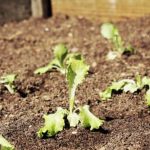Are you wondering, “Is grub killer safe for vegetable gardens?” Many gardeners are concerned about the potential risks of using grub killers in their vegetable gardens. In this article, we will explore the use of grub killers and their impact on vegetable gardens.
Grub killers are commonly used to control and eliminate destructive lawn pests such as grubs, but there is often concern about whether they are safe to use around edible plants. Understanding how grub killers work and the potential risks they pose is important for gardeners who want to maintain a healthy and productive vegetable garden.
In the following sections, we will delve into the workings of grub killers, potential risks associated with their use in vegetable gardens, tips for choosing safe options, application techniques, natural alternatives, soil health impacts, and maintenance practices to ensure a thriving vegetable garden. Whether you are a seasoned gardener or just starting out, this article will provide valuable insights into the use of grub killers in your vegetable garden.
How Grub Killers Work
Grub killers, also known as insecticides, work by targeting and killing the larvae of certain beetles, such as Japanese beetles and June bugs. These products typically contain chemicals that are toxic to these pests, effectively eliminating them from the garden. There are different types of grub killers available, including granular and liquid formulations, each with their own methods of application.
Chemical Action
Most grub killers work by interfering with the nervous system of the larvae. Some common active ingredients in these products include chlorantraniliprole, imidacloprid, and trichlorfon. These chemicals are designed to be ingested or absorbed by the grubs, causing paralysis and eventually death.
Targeted Application
When applied to vegetable gardens, grub killers can be specifically targeted to the areas where grubs are most likely to be found. By following proper application guidelines provided on the product label, gardeners can minimize the risk of exposure of other beneficial insects and plants to these chemicals.
Environmental Persistence
It is important to note that some grub killer chemicals may persist in the soil for an extended period after application. This can potentially affect not only the targeted pests but also impact other soil-dwelling organisms. As a result, it is crucial to consider both effectiveness against grubs and potential environmental impact when choosing a grub killer for your vegetable garden.
Potential Risks of Grub Killers in Vegetable Gardens
Grub killers are commonly used to control insect infestations in gardens, including vegetable gardens. While these products can be effective in eliminating pests, they also come with potential risks that gardeners should be aware of.
One of the main concerns with using grub killers in vegetable gardens is the possibility of chemical residue remaining on the produce. This residue can pose health risks to humans and animals if ingested, making it essential for gardeners to use caution when applying these products.
In addition to the risk of chemical residue on produce, there is also a potential for the active ingredients in grub killers to leach into the soil and water sources. This can have detrimental effects on the environment, as well as beneficial insects and organisms that are essential for a healthy garden ecosystem.
Furthermore, some grub killers may have a negative impact on non-targeted species, such as bees and other pollinators, which play a crucial role in vegetable garden health.
When considering the use of grub killers in vegetable gardens, it is important for gardeners to thoroughly research and understand the potential risks associated with these products. By being informed about the possible dangers and taking necessary precautions, gardeners can make more informed decisions regarding the application of grub killers while minimizing negative impacts on their gardens and the environment.
| Potential Risks | Impact |
|---|---|
| Chemical Residue on Produce | Possible health risks for humans and animals if ingested |
| Leaching into soil and water sources | Detrimental effects on environment and beneficial organisms |
| Negative impact on non-targeted species | Harmful effects on bees and other pollinators |
Choosing Safe Grub Killers for Vegetable Gardens
When choosing a grub killer for your vegetable garden, it is important to consider the safety of both your plants and the environment. Look for grub killers that are labeled as safe for vegetable gardens, as these products have been specifically formulated to target pests without harming edible plants. Additionally, opt for organic or natural options that do not contain harmful chemicals that can leach into the soil and affect the health of your vegetables.
One effective and safe grub killer option is to use nematodes, which are microscopic roundworms that naturally occur in soil. When applied to your garden, nematodes will seek out and kill grubs without posing any threat to your vegetables or other beneficial insects. Additionally, there are botanical insecticides available that are derived from natural plant extracts and are safe to use in vegetable gardens.
It is also important to read the labels carefully when selecting a grub killer for your vegetable garden. Pay attention to the active ingredients used in the product and ensure that they do not pose any risks to humans, pets, or wildlife. By choosing a safe and effective grub killer, you can protect your vegetable garden from pests while maintaining the integrity of your crops and minimizing environmental impact.
| Grub Killer Option | Safety Rating |
|---|---|
| Nematodes | Safe – does not harm vegetables |
| Botanical Insecticides | Derived from natural plant extracts |
Application Tips for Using Grub Killers in Vegetable Gardens
When using grub killers in vegetable gardens, it is important to follow application tips to ensure the safety and effectiveness of the product. Here are some helpful tips for applying grub killers in vegetable gardens:
- Read the label: Before applying any grub killer to your vegetable garden, carefully read and follow the instructions on the product label. Pay attention to any specific guidelines for application in vegetable gardens.
- Timing: Apply grub killers at the right time according to the life cycle of the grubs in your area. This will maximize the effectiveness of the product and minimize its impact on non-target organisms.
- Weather conditions: Consider applying grub killers during dry weather when rain is not expected. Moist soil can reduce the effectiveness of some products and may also increase the risk of runoff.
- Uniform coverage: Make sure to apply the grub killer evenly across your vegetable garden to ensure that it reaches all affected areas. Use a spreader or sprayer if necessary for more uniform coverage.
- Watering: After applying the grub killer, lightly water your vegetable garden to help activate and distribute the product into the soil where grubs are present.
By following these application tips, you can effectively use grub killers in your vegetable garden while minimizing potential risks to human health and environmental impact. Always prioritize safety and read product labels carefully before applying any chemicals in your garden.
Natural Alternatives to Grub Killers for Vegetable Gardens
When it comes to maintaining a healthy vegetable garden, many people are concerned about using chemical grub killers that may have potential risks. Fortunately, there are natural alternatives to grub killers that can effectively control the grub population in your vegetable garden without harming the environment or posing risks to your health.
Here are some natural alternatives to consider for controlling grubs in your vegetable garden:
- Nematodes: These microscopic organisms can be applied to the soil and will actively seek out and destroy grubs. They are a safe and effective way to control grubs without using harmful chemicals.
- Milky Spore: This is a naturally occurring bacterium that specifically targets Japanese beetle grubs. It can be applied to the soil and is safe for use around pets and wildlife.
- Diatomaceous Earth: This powder consists of fossilized remains of diatoms, which are sharp enough to penetrate the exoskeleton of grubs, causing them to dehydrate and die. It is safe for use around plants and animals.
Using natural alternatives to grub killers not only helps you maintain a healthy vegetable garden but also contributes to promoting a sustainable and eco-friendly gardening practice. By choosing these natural methods, you can effectively manage grub populations without compromising the safety of your vegetables or the surrounding environment.
Understanding the Impact of Grub Killers on Soil Health
When considering the use of grub killers in vegetable gardens, one important factor to consider is the impact that these chemicals can have on soil health. The health of your soil is crucial for the success of your garden, as it provides essential nutrients and support for plant growth. Understanding how grub killers can affect soil health is key to making an informed decision about whether or not to use them in your vegetable garden.
Chemical Impact on Soil Microorganisms
One potential impact of using grub killers in vegetable gardens is the harm they can cause to soil microorganisms. These beneficial microorganisms play a vital role in maintaining soil structure, promoting nutrient cycling, and protecting plants from diseases. Chemical grub killers can disrupt the balance of these microorganisms, leading to a decrease in soil fertility and overall health.
Soil Contamination
Another concern regarding the use of grub killers in vegetable gardens is the potential for soil contamination. Chemicals from these products can leach into the soil and groundwater, posing a risk to not only your garden but also surrounding plants and ecosystems. In addition, some chemicals may persist in the soil for extended periods, affecting future plant growth and potentially causing long-term damage to the environment.
Impact on Plant Health
The use of grub killers can also indirectly impact soil health by affecting the overall health of plants in your vegetable garden. Some chemicals may have negative effects on plant roots, leading to stunted growth or increased susceptibility to other pests and diseases. This can create a cycle of dependency on chemical treatments that further disrupts the natural balance of your garden ecosystem.
Understanding the potential impact of grub killers on soil health is crucial for making an informed decision about their use in vegetable gardens. Consideration should also be given to natural alternatives and integrated pest management practices that minimize harm to both your plants and the environment while maintaining healthy soil for future growing seasons.
Tips for Maintaining a Healthy Vegetable Garden While Using Grub Killers
In conclusion, while the use of grub killers in vegetable gardens can be effective in controlling pest infestations, it is important to carefully consider the potential risks and take steps to minimize any negative impact on the garden and surrounding environment. By choosing safe grub killers, following application tips, and exploring natural alternatives, gardeners can maintain a healthy vegetable garden while effectively managing pests.
It’s crucial for gardeners to prioritize the health of their soil when using grub killers. Understanding the impact of these products on soil health can help ensure that the long-term fertility and productivity of the garden are not compromised. Additionally, consistently monitoring the health of plants and soil, as well as taking proactive measures to mitigate any potential damage from grub killers, is essential for maintaining a thriving vegetable garden.
Ultimately, by staying informed about the best practices for using grub killers in vegetable gardens and actively seeking out safe and environmentally friendly options, gardeners can strike a balance between pest control and sustainability. With proper care and attention, it is possible to successfully manage pests while maintaining a healthy and productive vegetable garden for years to come.
Frequently Asked Questions
Is Grubex Safe for Vegetable Gardens?
Grubex is not considered safe for vegetable gardens as it contains chemicals that can negatively impact the health of the plants and potentially harm the soil. It’s important to look for alternative, more natural methods to address grub issues in vegetable gardens.
How Do I Get Rid of Grubs in My Garden Soil?
Getting rid of grubs in garden soil can be achieved through various methods. One approach is to use beneficial nematodes, which are microscopic organisms that target and kill grubs without causing harm to other organisms in the soil. Another method is applying milky spore powder, a natural bacteria that specifically targets Japanese beetle grubs.
Do Grub Worms Hurt Tomato Plants?
Grub worms can indeed hurt tomato plants by feeding on their roots, which can lead to weakened growth, decreased fruit production, and even plant death. It’s important to address grub infestations in the garden soil to prevent damage to tomato plants and other susceptible vegetables.
Using natural control methods like beneficial nematodes or milky spore powder can help protect tomato plants from grub damage without resorting to harmful chemicals.

If you’re looking to get into vegetable gardening, or are just looking for some tips on how to make your current garden better, then you’ve come to the right place! My name is Ethel and I have been gardening for years. In this blog, I’m going to share with you some of my best tips on how to create a successful vegetable garden.





